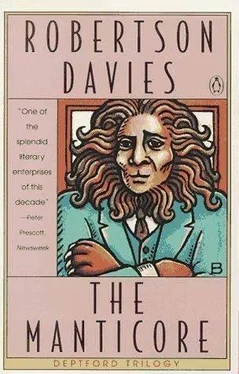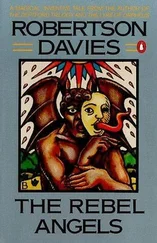Robertson Davies - The Manticore
Здесь есть возможность читать онлайн «Robertson Davies - The Manticore» весь текст электронной книги совершенно бесплатно (целиком полную версию без сокращений). В некоторых случаях можно слушать аудио, скачать через торрент в формате fb2 и присутствует краткое содержание. Жанр: Триллер, на английском языке. Описание произведения, (предисловие) а так же отзывы посетителей доступны на портале библиотеки ЛибКат.
- Название:The Manticore
- Автор:
- Жанр:
- Год:неизвестен
- ISBN:нет данных
- Рейтинг книги:3 / 5. Голосов: 1
-
Избранное:Добавить в избранное
- Отзывы:
-
Ваша оценка:
- 60
- 1
- 2
- 3
- 4
- 5
The Manticore: краткое содержание, описание и аннотация
Предлагаем к чтению аннотацию, описание, краткое содержание или предисловие (зависит от того, что написал сам автор книги «The Manticore»). Если вы не нашли необходимую информацию о книге — напишите в комментариях, мы постараемся отыскать её.
The Manticore — читать онлайн бесплатно полную книгу (весь текст) целиком
Ниже представлен текст книги, разбитый по страницам. Система сохранения места последней прочитанной страницы, позволяет с удобством читать онлайн бесплатно книгу «The Manticore», без необходимости каждый раз заново искать на чём Вы остановились. Поставьте закладку, и сможете в любой момент перейти на страницу, на которой закончили чтение.
Интервал:
Закладка:
That autumn Bishop Cairncross's was shaken by unreasonable ambition; the success of Crossings had been so great that the music staff and all the musical girls like Caroline and Judy were mad to do a real opera. Miss Gostling, after the usual Headmistress's doubts about the effect on schoolwork, gave her consent, and it was rumoured that unheard-of sums of money had been set aside for the project – something in the neighbourhood of five hundred dollars, which was a Metropolitan budget for the school.
What opera? Some of the girls were shrieking for Mozart; a rival band, hateful to Caroline, thought Puccini would be more like it, and with five hundred dollars they could not see why Turandot would not be the obvious choice. Of course the mistresses made the decision, and the music mistress resurrected, from somewhere, Mendelssohn's Son and Stranger . It was not the greatest opera ever written; it contained dialogue, which to purists made it no opera at all; nevertheless, it was just within the range of what schoolgirls could manage. So Son and Stranger it was to be, and quite hard enough, when they got down to it.
I heard all about it. Judy told me of its charms because its gemiitlich, nineteenth-century naivete appealed strongly to her; either she was innocent in her tastes or else sophisticated in seeing in this humble little work delights and possibilities the other girls missed; I rather think her feeling was a combination of both these elements. Caroline was a bore about its difficulties. She and another girl were to play the overture and accompaniments at two pianos, which is trickier than it seems. In full view, too; no hiding behind the scenes this time. Of course, as always with Caroline, nobody but herself knew just how it ought to be done, and the music mistress, and the mistress who directed the production, and the art mistress who arranged the setting, were all idiots, without a notion of how to manage anything. I even had my own area of agitation and knowing-best; if Miss Gostling were not such a lunatic, insisting that everything about the production be kept within the school, I could have mustered a crew of carpenters and scene-shifters and painters and electricians among the boys at Colborne who would have done all the technical work at lightning speed, with masculine thoroughness and craftsmanship, and guaranteed wondrous result. Both Judy and Carol and most of their friends agreed that this was undoubtedly so, but none of them quite saw her way to suggesting it to Miss Gostling, who was, as we all agreed, the last surviving dinosaur.
Not many people know Son and Stranger . Mendelssohn wrote it for private performance, indeed for the twenty-fifth wedding anniversary of his parents, and it is deeply, lumberingly domestic in the nineteenth-century German style. "A nice old bit of Biedermeier," said Dr. Wolff, and lent some useful books to the art mistress for her designs.
The plot is modest; the people of a German village are expecting a recruiting-sergeant who will take their sons away to fight in the Napoleonic wars; a peddler, a handsome charlatan, turns up and pretends to be the sergeant, hoping to win the favours of the Mayor's ward Lisbeth; but he is unmasked by the real sergeant, who proves to be Herrmann, the Mayor's long-lost soldier son, and Lisbeth's true love. The best part is the peddler, and there was the usual wrangle as to whether it should be played by a girl who could act but couldn't sing, or whether a girl who could sing but couldn't act should have it. The acting girl was finally banished to the comic role of the Mayor, who must have been no singer in the original production, for Mendelssohn had given him a part which stayed firmly on one note. Judy was Lisbeth, of course, and had some pretty songs and a bit of acting for which her quiet charm was, or seemed to me to be, exactly right.
At last early December came. Son and Stranger was performed for two nights, and of course it was a triumph. What school performance of anything is ever less than a triumph? Judy sang splendidly; Caroline covered herself with honour; even the embarrassing dialogue – rendered from flat-footed German into murderous English, Dr. Wolff assured me – was somehow bathed in the romantic light that enveloped the whole affair.
This year my father was in the audience, and cut a figure because everybody knew him from newspaper pictures and admired the great work he had done during the war years. I took Netty on the Friday and went again with Father on Saturday. He asked me if I really wanted to go twice or was I going just to keep him company; not long after Judy appeared on the stage I felt him looking at me with curiosity, so I suppose I was as bad at concealing my adoration as I had always been. Afterward, at the coffee and school-cake debauch in the dining-room, I introduced him to the Wolffs and the Schwarzes, and to my astonishment Judy curtsied to him – one of those almost imperceptible little bobs that girls used to do long ago in Europe and which some girls of Bishop Cairncross's kept for the Bishop, who was the patron of the school. I knew Father was important, but I had never dreamed of him as the kind of person anybody curtsied to. He liked it; he didn't say anything, but I knew he liked it.
If any greater glory could be added to my love for Judy, Father's approval supplied it. I had been going through hell at intervals ever since Mother's death because of Carol's declaration that I was Dunstan Ramsay's son. I had come to the conclusion that whether or not I was Ramsay's son in the flesh, I was Father's son in the spirit. He had not been at home during the period of my life when boys usually are possessed with admiration for their fathers, and I was having, at seventeen, a belated bout of hero-worship. Sometimes I had found Ramsay's saturnine and ironic eye on me at school, and I had wondered if he were reflecting that I was his child. That seemed less significant now because Father's return had diminished Ramsay's importance; after all, Ramsay was the Acting Headmaster of Colborne, filling in for the war years, but Father was the Chairman of the school's Board of Governors and in a sense Ramsay's boss, as he seemed to be the boss of so many other people. He was a natural boss, a natural leader. I know I tried to copy some of his mannerisms, but they fitted me no better than his hats, which I also tried.
Father's return to Toronto caused a lot of chatter, and some of it came to my ears because the boys with whom I was at school were the sons of the chatterers. He had been remarkable as a Minister of Food, a Cabinet position that had made him even more significant in the countries we were supplying during the war than at home. He had been extraordinary in his ability to get along with Mackenzie King without wrangling and without any obvious sacrifice of his own opinions, which were not often those of the P.M. But there was another reputation that came home with him, a reputation spoken of less freely, with an ambiguity I did not understand or even notice for a time. This was a reputation as something called "a swordsman".
It is a measure of my innocence that I took this word at its face value. It was new then in the connotation it has since acquired, and I was proud of my father being a swordsman. I assumed it meant a gallant, cavalier-like person, a sort of Prince Rupert of the Rhine as opposed to the Cromwellian austerity of Mackenzie King.
When boys at school talked to me about Father, as they did because he was increasingly a public figure, I sometimes said, "You can sum him up pretty much in a word – a swordsman." I now remember with terrible humiliation that I said this to the Wolffs, who received it calmly, though I thought I saw Mr. Wolffs nostrils pinch and if I had been more sensitive I would surely have noticed a drop in the social temperature. But the word had such a fine savour in my mouth that I think I repeated it; I knew the Wolffs and Schwarzes liked me, but how much better they would like me if they understood that I was the son of a man who was recognized for aristocratic behaviour and a temperament far above that of the upper-bourgeois world in which we lived and which, in Canada, was generally supposed to be the best world there was. Swordsmen were people of a natural distinction, and I was the son of one of them. Would I ever be a swordsman myself? Oh, speed the day!
Читать дальшеИнтервал:
Закладка:
Похожие книги на «The Manticore»
Представляем Вашему вниманию похожие книги на «The Manticore» списком для выбора. Мы отобрали схожую по названию и смыслу литературу в надежде предоставить читателям больше вариантов отыскать новые, интересные, ещё непрочитанные произведения.
Обсуждение, отзывы о книге «The Manticore» и просто собственные мнения читателей. Оставьте ваши комментарии, напишите, что Вы думаете о произведении, его смысле или главных героях. Укажите что конкретно понравилось, а что нет, и почему Вы так считаете.












